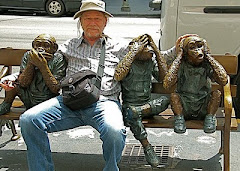 |
| My neighbor's beloved horse |
We fool ourselves by believing if only we had more facts and better technology, we could solve any problem, even climate change and, perhaps, even death itself.
But that’s not how the world works, according to psychoanalyst and philosopher Jonathan Lear. He says it’s pure fantasy to believe that every want can be gratified, although it is a phase that babies go through. That’s because, for the baby, it’s all or nothing: “Either you want to be omnipotent, or you want someone else to be omnipotent for you, or you want to kill everyone else.”1 (Doesn’t that sound like someone currently running to be president? But that’s a story for another time.)
Lear’s psychoanalytic insight – so essential for us today – is that healthy development requires outgrowing the notion that humans have god-like powers. “Approaching the world with the expectation that every problem must be solved, soon and completely, comes from a failure to reckon with our own and the world’s limits.”
But, even though we may be frail and flawed, we can’t curl up in a ball when an overwhelming crisis arises. We have no choice but to stand tall and do what we can: “Take care of the people close to us. Work politically to improve things. Appreciate beauty and nobility in others. Be an exemplar for others. Make meaning. Creatively and repeatedly engage with the past. Have hope. Resist despair.”2
Conducting ourselves in such a stand-up manner – beyond the actions themselves – has existential importance because it is precisely these relational qualities that make us uniquely human and give meaning to our lives. Unfortunately, for some time now, rather than celebrating our humanness with gratitude, we have been seduced into worshipping the false god of technology.
Yes, technology has augmented our limited capabilities, but in doing so, it has hoodwinked us into believing humans can do anything, replacing our caring human values with machine algorithms prioritizing efficiency and profit.
Rather than paying attention to others through kindness and empathy, we are being forced into an ‘iron yoke of efficiency and meritocracy” by technocrats like Elon Musk, Bill Ackman, and Mark Zuckerberg.3
We are rapidly being transformed into automatons who meekly report to our online masters, obeying online prompts to wait for hours to speak to the next customer representative, who, at the end of the call, tells us they can’t help us. Personally, I look to the past for wisdom and guidance from mentors like that living exemplar of the past himself, Wendell Berry.
Berry has long warned us of the dangers that lie ahead: “It is easy for me to imagine that the next great division of the world will be between people who wish to live as creatures and people who wish to live as machines.”4
Berry disputes the notion that the definition of an intelligent person is “the Quiz Kid—a human shape barely discernible in a fluff of facts.” Instead, he proposes a solution remarkably similar to that of Jonathan Lear:
“To think better, to think like the best humans, we are probably going to have to learn again to judge a person’s intelligence, not by the ability to recite facts, but by the good order or harmoniousness of his or her surroundings. We must suspect that any statistical justification of ugliness and violence is a revelation of stupidity.”5
In the end, Lear and Berry both contend that no matter what happens – or how catastrophic – we will be judged in the end, not on whether we won or lost, but by how we lived our lives.
Or, in Berry’s words, quoting an earlier student of agriculture, “The intelligent man, however unlearned, may be known by his surroundings, and by the care of his horse, if he is fortunate enough to own one.”6
xxx
1 https://www.washingtonpost.com/books/2022/11/09/imagining-end-mourning-ethics-lear-review/
2 Ibid
3 https://www.washingtonpost.com/technology/2024/02/10/bill-ackman-end-dei-industry/
4 Berry, Wendell. Standing by Words (p. 84). Catapult. Kindle Edition.
5 Ibid. Page 84
6 Ibid. Page 84



















